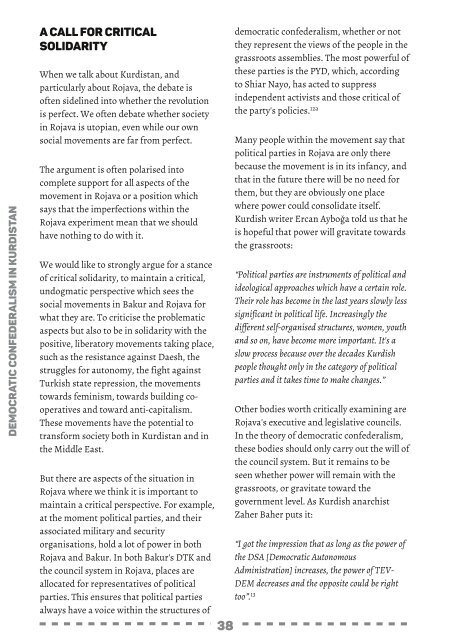STRUGGLES
Struggles-for-autonomy-in-Kurdistan
Struggles-for-autonomy-in-Kurdistan
Create successful ePaper yourself
Turn your PDF publications into a flip-book with our unique Google optimized e-Paper software.
democratic confederalism in kurdistan<br />
A call for critical<br />
solidarity<br />
When we talk about Kurdistan, and<br />
particularly about Rojava, the debate is<br />
often sidelined into whether the revolution<br />
is perfect. We often debate whether society<br />
in Rojava is utopian, even while our own<br />
social movements are far from perfect.<br />
The argument is often polarised into<br />
complete support for all aspects ofthe<br />
movement in Rojava or a position which<br />
says that the imperfections within the<br />
Rojava experiment mean that we should<br />
have nothing to do with it.<br />
We would like to strongly argue for a stance<br />
ofcritical solidarity, to maintain a critical,<br />
undogmatic perspective which sees the<br />
social movements in Bakur and Rojava for<br />
what they are. To criticise the problematic<br />
aspects but also to be in solidarity with the<br />
positive, liberatory movements taking place,<br />
such as the resistance against Daesh, the<br />
struggles for autonomy, the fight against<br />
Turkish state repression, the movements<br />
towards feminism, towards building cooperatives<br />
and toward anti-capitalism.<br />
These movements have the potential to<br />
transform society both in Kurdistan and in<br />
the Middle East.<br />
But there are aspects ofthe situation in<br />
Rojava where we think it is important to<br />
maintain a critical perspective. For example,<br />
at the moment political parties, and their<br />
associated military and security<br />
organisations, hold a lot ofpower in both<br />
Rojava and Bakur. In both Bakur's DTK and<br />
the council system in Rojava, places are<br />
allocated for representatives ofpolitical<br />
parties. This ensures that political parties<br />
always have a voice within the structures of<br />
38<br />
democratic confederalism, whether or not<br />
they represent the views ofthe people in the<br />
grassroots assemblies. The most powerful of<br />
these parties is the PYD, which, according<br />
to Shiar Nayo, has acted to suppress<br />
independent activists and those critical of<br />
the party's policies. 12a<br />
Many people within the movement say that<br />
political parties in Rojava are only there<br />
because the movement is in its infancy, and<br />
that in the future there will be no need for<br />
them, but they are obviously one place<br />
where power could consolidate itself.<br />
Kurdish writer Ercan Ayboğa told us that he<br />
is hopeful that power will gravitate towards<br />
the grassroots:<br />
“Political parties are instruments ofpolitical and<br />
ideological approaches which have a certain role.<br />
Their role has become in the last years slowly less<br />
significant in political life. Increasingly the<br />
different self-organised structures, women, youth<br />
and so on, have become more important. It's a<br />
slow process because over the decades Kurdish<br />
people thought only in the category ofpolitical<br />
parties and it takes time to make changes.”<br />
Other bodies worth critically examining are<br />
Rojava's executive and legislative councils.<br />
In the theory ofdemocratic confederalism,<br />
these bodies should only carry out the will of<br />
the council system. But it remains to be<br />
seen whether power will remain with the<br />
grassroots, or gravitate toward the<br />
government level. As Kurdish anarchist<br />
Zaher Baher puts it:<br />
“I got the impression that as long as the power of<br />
the DSA [Democratic Autonomous<br />
Administration] increases, the power ofTEV-<br />
DEM decreases and the opposite could be right<br />
too”. 13


